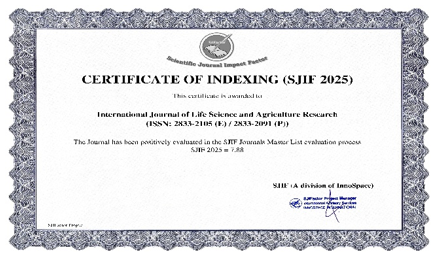Bacterial Examination in Spoiled Vegetables, Its Isolation, Identification and Antibacterial Activity of Turmeric, Pongamia and Betel Leaf
DOI:
https://doi.org/10.55677/ijlsar/V02I09Y2023-03Keywords:
Vegetables, Spoilage, Turmeric, Pongamia pinnata, Betel leaf, Antibacterial activity, Phytochemical analysisAbstract
Microbial contamination is a major concern in the food and pharmaceutical industries, leading to economic losses and public health risks. Natural products such as turmeric, betel leaf, and Pongamia leaves have been traditionally used for their antimicrobial properties. This thesis aimed to examine, identify, and isolate bacteria from selected spoiled vegetable samples and to evaluate the antibacterial activity of turmeric, betel leaf and Pongamia leaves. Bacterial isolation was performed using standard microbiological techniques, and the identification was done based on cultural characteristics. The antibacterial activity was assessed using disc diffusion method. The results showed the presence of bacterial contaminants in the tested samples, including Staphylococcus sp. And Escherichia coli. The turmeric, betel leaf, and Pongamia leaves extracts exhibited significant antibacterial activity against the tested bacteria. The phytochemical analysis of the extracts revealed the presence of alkaloids, flavonoids, phenols, tannins, and saponins, which may contribute to their antibacterial properties. This research provides valuable insights into the microbial contamination of food and pharmaceutical samples and the potential of natural products as antimicrobial agents. The findings of this study can contribute to the development of new antimicrobial agents based on natural products and the improvement of food and pharmaceutical safety.
References
Saranraj, P., Stella, D., and Reetha, D. (2012). Microbial Spoilage of Vegetables and its Control Measures. International Journal of Natural Product Science, 2(2): 1-12.
Adebayo-Tayo, B C., Odu, N. (2012). Microorganism Associated With Spoilage Of Stored Vegetables In Uyo Metropolis, AkwaIbom State, Nigeria. Nature and Science, 10(3)
Ashwitha, K., Steffi D’Souza. 2022. Exploration of Microbes in Different Spoiled Fruits and Vegetables. International Journal of Current Microbiology and Applied Sciences, 11(08): 8-16
Zahid Iqbal Sajid, Farooq Anwar, Ghulam Shabir. (2012). Antioxidant, Antimicrobial Properties and Phenolics of Different Solvent Extracts from Bark, Leaves and Seeds of Pongamia pinnata (L.) Pierre. Molecules, 17: 3917-3932. 25.
Ni Made Dwi Mara WidyaniNayaka, Maria MalidaVernandesSasadara. (2021). Piper betle (L): Recent Review of Antibacterial and Antifungal Properties, Safety Profiles, and Commercial Applications. Molecules, 26: 2-26. 28.
RanaPratap Singh and D.A. Jain. (2011). Evaluation of Antimicrobial activity of Volatile Oil and total Curcuminoids extracted from Turmeric. International Journal of ChemTech Research, 3(3):1172-1178.
OluwadaraAlegbeleye, OlumideAdedokumOdeyemi. 2022. Microbial Spoilage of Vegetables, Fruits and Cereals, Applied Food Research, 2: 27725022.
Dong Hwan Lee, Jin-Beom Kim. 2013. Microbiota on Spoiled Vegetables and Their Characterization. Journal of Food Protection, 76(80): Pages 1350-1358.18.
Vivek K. Bajpai, Atiqur Rahman, Savita Shukla. (2009).Antibacterial activity of leaf extracts of Pongamia pinnata from India. Pharmaceutical Biology, 47(12): 1162-1167. 21.
Devjani Chakraborty, Barkha Shah. (2011). Antimicrobial, Anti-Oxidative and Anti-Hemolytic Activity of Piper betle Leaf Extracts. International Journal of Pharmaceutical Sciences, 3(8): 192-199.












